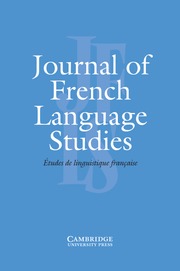Article contents
The Case of special qui
Published online by Cambridge University Press: 13 March 2017
Abstract
Feature Inheritance (Richards 2007) entails that uninterpretable features originate on the phase head C or v* and are then transferred to the associated Agree head, T or V. In the present article, it is argued that the French que–qui alternation is the locus of a Case contrast, implying that nominative Case originates on the complementiser and only becomes associated with T as a consequence of feature transfer. Que–qui thus provides new, Case-based empirical support for the theory of Feature Inheritance. The article also suggests that the que–qui alternation has an important implication for Chomsky's recent application of dynamic antisymmetry, reinterpreted in terms of labelling, to the issue of subject extraction failure. Specifically, the alternation appears to indicate that Case-matching is required, in addition to phi-feature agreement, in order for extraction to be blocked by labelling.
- Type
- Articles
- Information
- Copyright
- Copyright © Cambridge University Press 2017
References
REFERENCES
- 2
- Cited by



